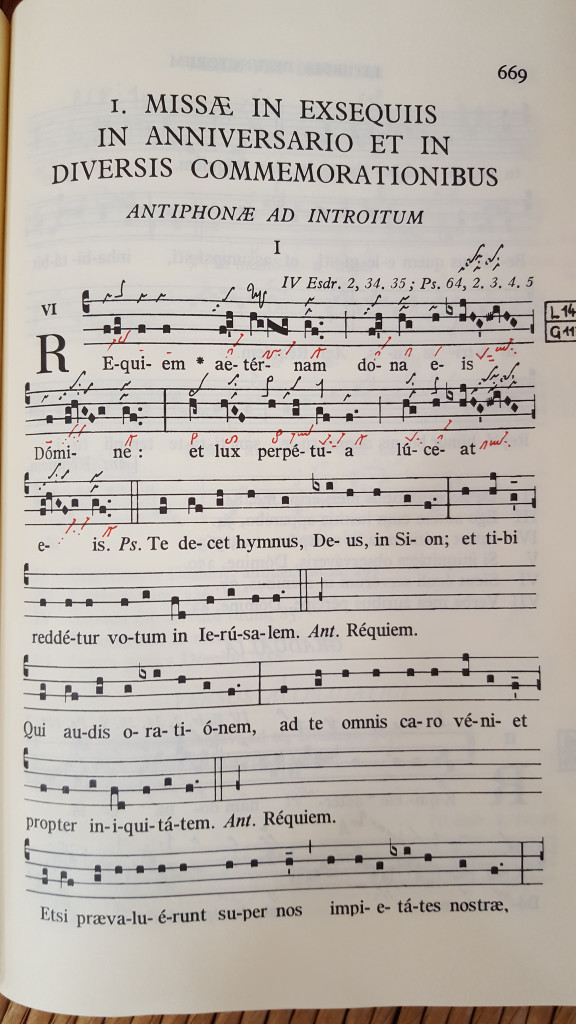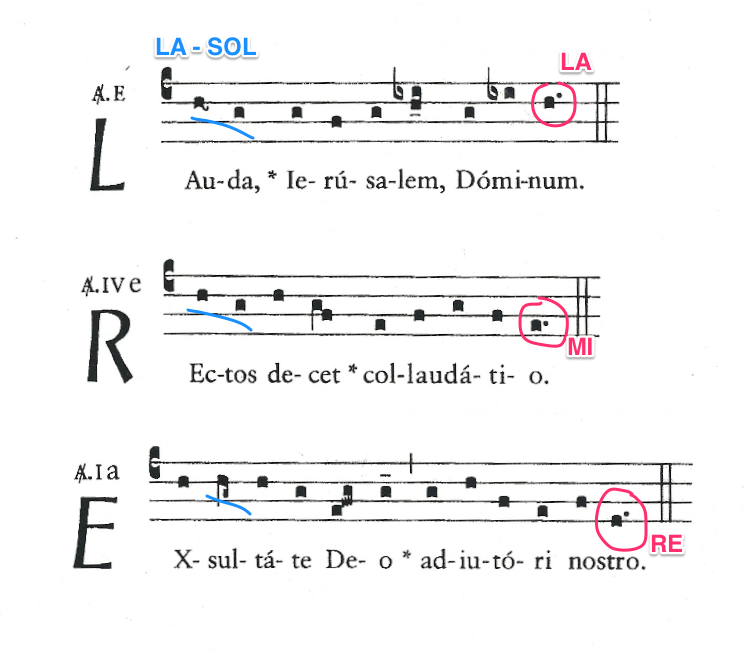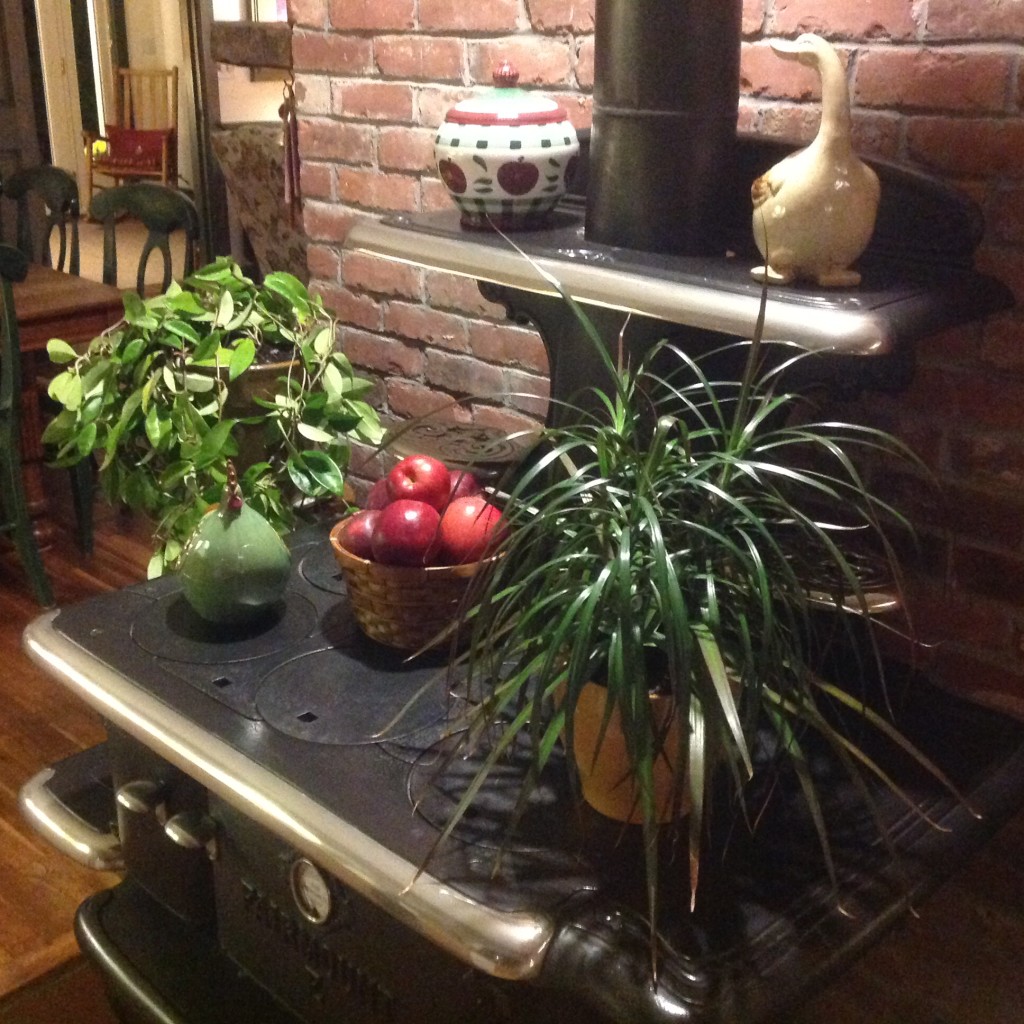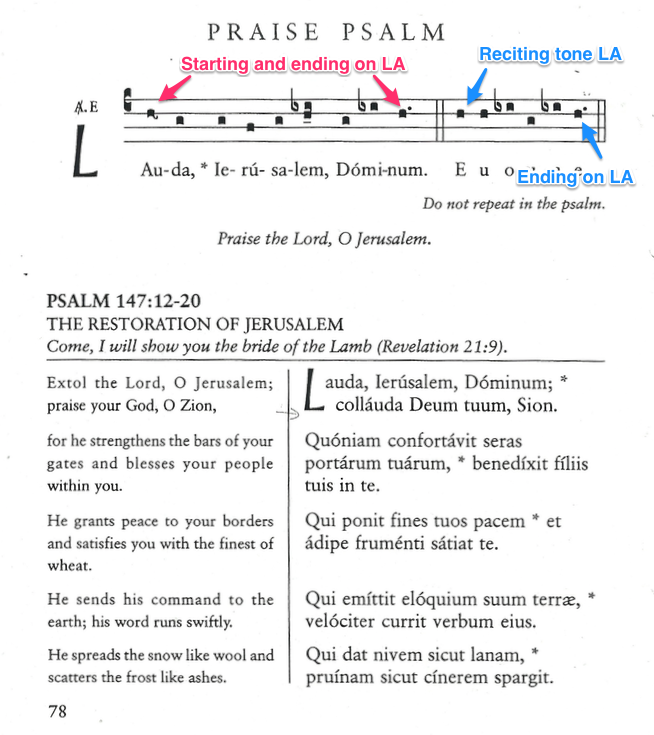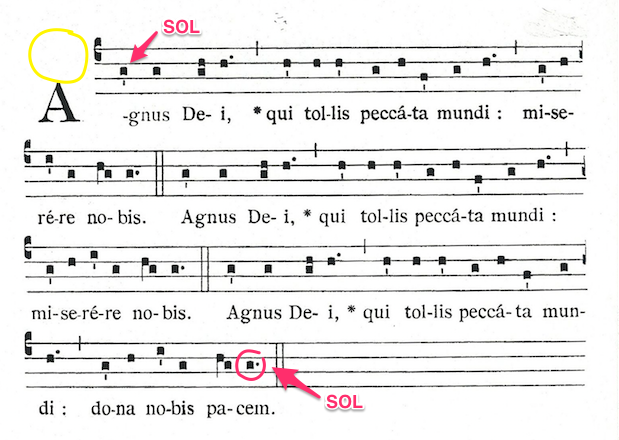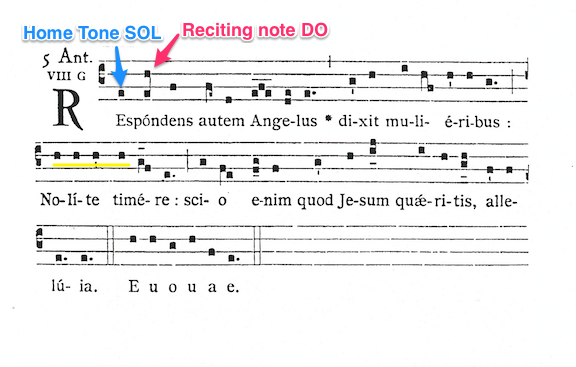Monthly Archives: October 2015
Requiem
By Sr. Fidelis
Yesterday we celebrated All Saints’ Day, one of the major feasts of the church year. There is evidence that this feast goes back at least to the 4th century. In 998, November 2nd became the day that All Souls Day was added to the Church Calendar. We can trace its existence back to the famous French Abbey of Cluny, where the Benedictine Abbot declared a day in which the monks commemorated all the dead of the Monastic Order. Soon this Cluny practice was adopted by the whole of the Western Church as a general commemoration of all those who had died.
The Mass for the dead contains some of the most beautiful music in the Gregorian repertoire. These important prayers are well known because they were chanted and prayed so often. The name “Requiem Mass” comes from the Introit for the Mass of the Dead, “Requiem aeternam.” This beautifully simple Mode VI chant is a prayer for the faithful departed. Eternal rest give to them, O Lord, and let perpetual light shine upon them. The psalm verse is translated: A hymn, O God, becometh thee in Zion, and a vow shall be paid to Thee in Jerusalem.
Growing Love

Gregorian Chant: Evolution
By Sr. Fidelis
Simple chants of only 2 or 3 notes, that circle around a single pitch, are most likely very ancient. However, over time, the final pitches began to descend, and we see an expansion of range from the Reciting Tone to the Home Tone. Below are 3 brief antiphons—all beginning very similarly on LA and SOL. But look at the endings! The first ends on LA—obviously one of the very early ones.. The second antiphon descends to a MI. We know this as Mode IV; and the final antiphon descends to RE, which gives us the formula for Mode I.
Here is a very simplistic “snap shot” of some of the changes that took place in the Gregorian repertoire over the centuries.
Feng Shui: Early American Style
By Sr. Nun Other
I’m told by a sister of Chinese heritage that I practice feng shui. And I thought I was merely rearranging furniture! I convinced her to join me, and, as we worked together, I periodically asked, “What’s that called again?” Feng shui, pronounced “fung shway,” the study of the relationship between environment and human life. It’s composed of two Chinese words, feng (wind) and shui (water), two life sustaining natural elements that flow and circulate throughout the Earth. It is also referred to as the art of placement: how to place furniture, possessions, and yourself within your surroundings to best achieve balance, comfort, and harmony. The wing of the Convent, where my Chinese sister and I live, leans toward early American design. Matters not what your particular decorating taste is. With prayerful consideration, we can create a space of beauty that reflects God’s presence in our lives.
Hearing Joy
By Sr. Spero
In the Lauds service this morning, I noticed that the psalm verse familiar to me as “Let me hear of joy and gladness” (Psalm 51:8) was translated “Let me hear joy and gladness.” At first I thought it was a mistake. But then I considered—is this what the Psalmist really meant. Not—“ let someone come to me with good news,” but “let me hear joy.” Hearing joy has nothing to do with outward circumstances. It is an act of the will to listen to the joy that is surrounding us. The heavens declare the glory of God. (Psalm 19:1) The heavens praise your wonders, LORD (Psalm 89:5). The Scriptures that that it is there. Do I listen for joy? Do I open my ears to catch it? Not often. But is it possible if I set my will to listen for it? Yes!
Origins
By Sr. Fidelis
Look at the antiphon below—a perfect example! It recites on LA and returns to LA. (Remember that solfege came after the fact) These simple cantillations were already in existence. Listen to Lauda Jerusalem, which then segues into Psalm 147, verses 12-20. The Psalm tone also returns to the LA, just as the antiphon does.
Stay tuned next week, when we’ll look at several other antiphons which use these same pitches, but then descend to a lower pitch, so we can actually see this evolution!
In Memoriam – Phyllis Tickle
Today, in celebration of Phyllis Tickle’s life, we share with you an open letter, written in thanksgiving for her friendship, guidance, and love over the last twenty years.
Dear Phyllis,
What can we, at the Community of Jesus, say about you? How much of a friend you were, how we miss you terribly now and feel a hole in our days when we let ourselves think of you, and all that you have meant to us and done for the church?
We remember your great laugh and your warmth of spirit, how you would encourage and challenge us to think beyond what we knew, to what is unknown, and maybe uncomfortable, but possibly something new to consider. Where do we get this kind of friend? A friend who would stick her neck out — knowing she was throwing some people into a frenzy of confusion, and yet, at the same time, feeling it’s a necessary duty.
We know you also enjoyed those moments. You didn’t hide the twinkle in your eye when your probing had moved one of us off our chess spot, so that we bumped the Knight next to us and now saw the Queen from a completely different angle. Yes, there were some very crafty moves, and yet, you weren’t just crafty, you were interested in the growth of an individual and its direct effect on the church. Open the doors of the mind, let there be new ideas, let our words speak to a church in need, not a church we wish existed. These were your words, and you were an evangelist and advocate, eager to live out your faith on the hoof with great intention and integrity.
We miss you, friend. We see your hand at Paraclete Press, and you will always be with us as a reminder to keep our sights on the future and the needs of a hurting world — of which we are a part — and to live out that vocation in the market place.
We miss you, friend. We remember your words and your impassioned plea that the theater of the church be vital and full, retelling the great stories of faith and the riches of God’s promises to his people. Elements Theatre Company owns this charge.
We miss you, friend. We hear your chortles and southern twang as you tell stories and enjoy a visit with friends and colleagues, believing that at the basis of relationships, commitment and faith were paramount.
It has been our great privilege to know you and work with you, to sit with you and talk with you, to be a part of the church together and serve its future.
With our great love and affection,
Your friends and family at the Community of Jesus
And flights of Angels sing thee to thy rest. Hamlet V,ii
In Memoriam – Phyllis Tickle
Today, in celebration of Phyllis Tickle’s life, we share with you an open letter, written in thanksgiving for her friendship, guidance, and love over the last twenty years.
Dear Phyllis,
What can we, at the Community of Jesus, say about you? How much of a friend you were, how we miss you terribly now and feel a hole in our days when we let ourselves think of you, and all that you have meant to us and done for the church?
We remember your great laugh and your warmth of spirit, how you would encourage and challenge us to think beyond what we knew, to what is unknown, and maybe uncomfortable, but possibly something new to consider. Where do we get this kind of friend? A friend who would stick her neck out — knowing she was throwing some people into a frenzy of confusion, and yet, at the same time, feeling it’s a necessary duty.
We know you also enjoyed those moments. You didn’t hide the twinkle in your eye when your probing had moved one of us off our chess spot, so that we bumped the Knight next to us and now saw the Queen from a completely different angle. Yes, there were some very crafty moves, and yet, you weren’t just crafty, you were interested in the growth of an individual and its direct effect on the church. Open the doors of the mind, let there be new ideas, let our words speak to a church in need, not a church we wish existed. These were your words, and you were an evangelist and advocate, eager to live out your faith on the hoof with great intention and integrity.
We miss you, friend. We see your hand at Paraclete Press, and you will always be with us as a reminder to keep our sights on the future and the needs of a hurting world — of which we are a part — and to live out that vocation in the market place.
We miss you, friend. We remember your words and your impassioned plea that the theater of the church be vital and full, retelling the great stories of faith and the riches of God’s promises to his people. Elements Theatre Company owns this charge.
We miss you, friend. We hear your chortles and southern twang as you tell stories and enjoy a visit with friends and colleagues, believing that at the basis of relationships, commitment and faith were paramount.
It has been our great privilege to know you and work with you, to sit with you and talk with you, to be a part of the church together and serve its future.
With our great love and affection,
Your friends and family at the Community of Jesus
And flights of Angels sing thee to thy rest. Hamlet V,ii
Hearts that Welcome
By Sr. Nun Other
We did some fall housecleaning last night, starting with kitchen cupboards. Threw out some “lids to nowhere,” a melted turkey baster, and an old plastic measuring cup. It feels good to have dust-free, clutter-free cupboards, and a mental inventory of what’s available. I sometimes wonder what Mary’s house looked like. As Jesus’ mother, her life was always eventful, with an expectation for the unexpected. I imagine her home to be clean, orderly, and ready to welcome. But then I have a reputation for obsessive neatness. I prefer to think of it as stress avoidance. Friends with busy lives sometimes ask for advice, and it’s very basic: remove clutter, which I define as anything not necessary or beautiful. Beautiful is up to you—could be children’s art—or any number of things. To truly save time, avoid short-cuts—an oxymoron but true.
Psalm 84 tells of God’s lovely dwelling place, a place of peace and beauty that draws our weary hearts. Blessed are those who dwell in your house; they are ever praising you. “Selah.” Blessed are those whose strength is in you, who have set their hearts on pilgrimage.
Hearts that Welcome
By Sr. Nun Other
We did some fall housecleaning last night, starting with kitchen cupboards. Threw out some “lids to nowhere,” a melted turkey baster, and an old plastic measuring cup. It feels good to have dust-free, clutter-free cupboards, and a mental inventory of what’s available. I sometimes wonder what Mary’s house looked like. As Jesus’ mother, her life was always eventful, with an expectation for the unexpected. I imagine her home to be clean, orderly, and ready to welcome. But then I have a reputation for obsessive neatness. I prefer to think of it as stress avoidance. Friends with busy lives sometimes ask for advice, and it’s very basic: remove clutter, which I define as anything not necessary or beautiful. Beautiful is up to you—could be children’s art—or any number of things. To truly save time, avoid short-cuts—an oxymoron but true.
Psalm 84 tells of God’s lovely dwelling place, a place of peace and beauty that draws our weary hearts. Blessed are those who dwell in your house; they are ever praising you. “Selah.” Blessed are those whose strength is in you, who have set their hearts on pilgrimage.
More Discoveries
By Sr. Fidelis
We have taken a “romp” through the eight Church Modes over these past weeks and, for each mode, we have talked about the principal pitches, the Reciting Tone, and Home Tone. There is always a “descent,” to the Home Tone at the end of the chants we have looked at, which gives it a feeling of “settling,” or completion.
In some of the older books for the Divine Office and the Mass, you will see some chants with no Mode listed in the customary place to the left of the piece. If you look carefully at the Agnus Dei posted below, here is a case in point! This Agnus Dei begins on Sol. It goes above and below this pitch, but then, instead of descending to a lower pitch, it returns to the same pitch it began on. It is almost as if the melody were “circular” —returning to its start!
There have been many studies done on Modality over the years, and it has been discovered that some of the melodies that have the same Reciting and Home Tone are very ancient—the beginnings of the chant melodies.
We’ll be looking into some of these discoveries in the weeks to come!
(No audio this week.)
A Glad and Grateful Heart
By Sr. Nun Other
I did laundry the other day, and noticed a drip or two of liquid detergent on our new washer. A Christmas gift from a sister’s mother, it’s beautiful, state-of-the-art, and eco-friendly. It even plays a little tune when you open the lid, six musical notes that somehow convey how great clean laundry is. As I reached for a cloth and spray cleaner to remove the drips, I was reminded of an early lesson I received.
The lesson was about a grateful heart, and the teacher was my sister, twelve years older than I am. She had asked for my help at the laundromat, and we had several baskets full. After the last load was neatly folded, my sister added one more task: she cleaned and polished both the washer and dryer she’d used. I asked her why, and her reply made a deep impression. She explained that because she and her husband struggled financially, they were unable to afford a washer and dryer for their home. But she was grateful for the laundromat and the opportunity it provided. Why not treat their machines as if they were her own. It was a lesson about expressing love and gratitude in a practical way, for ordinary things. For me, a grateful heart is a concept with its feet on the ground.
Saint Simeon
The feast of Simeon is celebrated on October 8th. Simeon is one of my favorite saints. We know him only from his welcoming the infant Jesus, and his mother and father, into the temple. But the words of his welcome have become immortalized in what we know as the Nunc dimittis. For centuries the Nunc dimittis has been joined with the Magnificat to provide the outline for evening worship. Composers throughout the history of the Church have set it to different melodies to allow us to join in that very special moment of worship in the temple in Jerusalem.
Lord, now lettest thou thy servant depart in peace, according to thy word:
For mine eyes have seen thy salvation,
Which thou hast prepared before the face of all people;
A light to lighten the Gentiles, and the glory of thy people Israel.
City of Glass
By Melodious Monk
I met a new friend this week, Welsh poet R. S. Thomas. While recently feeling a little lost and tired of looking for God with seemingly no answer back, I went to a shelf of poetry books in hopes that someone else’s words might open my eyes a bit differently.
Perhaps it was Paul Powis’ colorful illustration on the front cover of the R. S. Thomas collection that caught my attention, but every poem of R. S. Thomas that I read I find compelling, thought-provoking, and profoundly mysterious.
One such poem is titled, “the empty church. “ I spend a significant amount of time in an empty church here at the Community of Jesus– either cleaning, doing maintenance work, or praying alone–so, in quickly glancing through the index, this poem’s title leaped out at me as one to read.
The Empty Church
They laid this stone trap
for him, enticing him with candles,
as though he would come like some huge moth
out of the darkness to beat there.
Ah, he had burned himself
before in the human flame
and escaped, leaving the reason
torn. He will not come any more
to our lure. Why, then, do I kneel still
striking my prayers on a stone
heart? Is it in hope one
of them will ignite yet and throw
on its illumined walls the shadow
of someone greater than I can understand?
In the short time I’ve spent with this Anglican priest’s poetry, I have found a strong sense of the knowledge of God’s presence when, and perhaps especially when, He is not tangible to us. I often ask God why this road through life has so many components that often feel pointless or at cross-purposes with one another. I think Thomas might say that our inability to understand God in our lives is not something to be afraid of. At the end of his poem Emerging, Thomas reminds us that God has destined us for good.
There are questions we are the solution
to, others whose echoes we must expand
to contain. Circular as our way is,
it leads not back to that snake-haunted
garden, but onward to the tall city
of glass that is the laboratory of the spirit.
Poetry by R. S. Thomas. Artwork by Paul Powis
Mode VIII
By Sr. Fidelis
Mode VIII is the most prolific of all the modes when it comes to antiphons! Mode VIII has a Reciting Tone of DO and shares the same Home Tone as Mode VII, which is SOL. Mode VIII pieces have a “major” sound to them because of the range of the modal scale they use. Our example this week is taken from the Easter Office of Lauds.”But the Angel answering, said to the women: Do not be afraid; for I know that you seek Jesus, alleluia.” (Matthew 28:5)
A look at our antiphon shows us many things. The opening intonation outlines the key structural pitches, SOL and DO. There is recitation on the DO on “Nolite timere” at the beginning of the second line. This piece reminds us of Mode VII (which recites on RE), as it rises in several spots above the DO to the upper pitch, reminding us that these modes are closely related, linked by their shared Home tone.
Saint Francis
Sunday, October 4th is the feast day of Francis of Assisi, the world’s most popular saint!
Desert Beauty
By Sunset Septuagint
Last week, we had a funeral for one of our earliest religious Sisters. At the burial site, someone mentioned her love for the desert. That struck a chord with me, because I have had a love for the desert ever since I traveled one day over the desert from Amman, Jordan to Cairo, Egypt, and then another time from the North to the South of Israel. I felt the power of the desert, the force of shifting sands, the strength to survive that only God can give, I also saw the beauty in the desert, often in small and hidden plants dependent on God for their blooming. I was reminded of several scriptures from Isaiah: the wilderness and the dry land shall be glad, the desert shall rejoice and blossom. . . . they shall see the glory of the Lord, the majesty of our God. . . I am about to do a new thing; now it springs forth, do you not perceive it?
